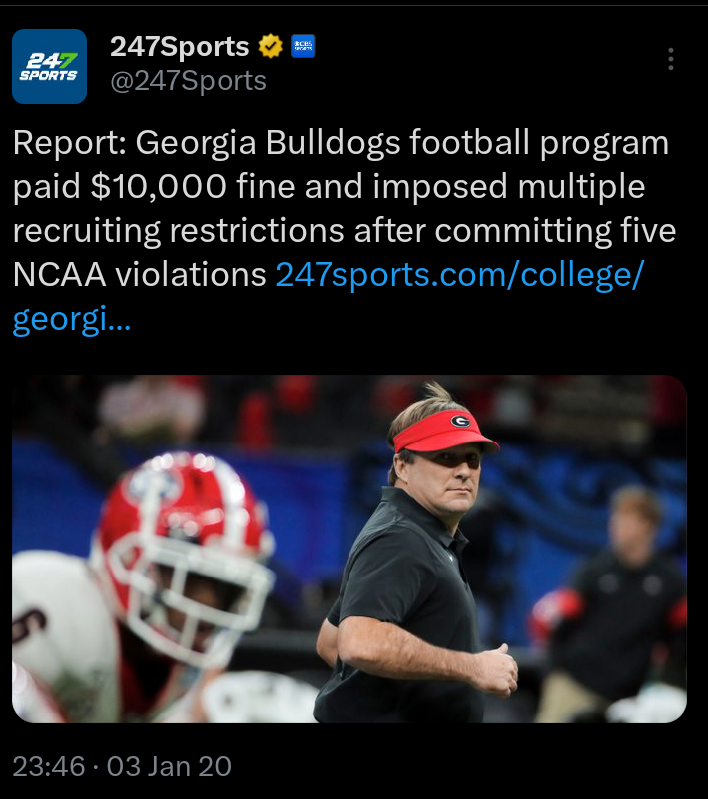Georgia Bulldogs Football Program Fined $10,000 and Faces Recruiting Restrictions for NCAA Violations
The Georgia Bulldogs football program, one of the most dominant forces in college football under head coach Kirby Smart, has found itself facing NCAA sanctions after committing multiple violations. According to a recent report, Georgia has paid a $10,000 fine and self-imposed recruiting restrictions following five NCAA violations. While the penalties are relatively minor, they highlight the ever-present challenges of compliance in today’s fast-moving recruiting landscape.
As Georgia continues to build upon its national championship success, these violations serve as a reminder of the fine line between aggressive recruiting and breaking NCAA rules. Let’s break down what happened, what penalties Georgia faces, and what this means for the program moving forward.
Breaking Down the NCAA Violations
The NCAA report outlines five separate violations that led to Georgia’s punishment. While the specific details of each infraction have not been fully disclosed, reports suggest that they primarily fall under recruiting violations and impermissible benefits.
These types of violations are fairly common across high-level college football programs, but that does not mean they come without consequences. The NCAA takes recruiting infractions seriously, especially in an era where NIL (Name, Image, and Likeness) deals and the transfer portal have complicated traditional recruiting efforts.
What Were the Violations?
Although full details have not been released, common NCAA recruiting violations that programs have been penalized for in the past include:
- Impermissible Contact with Recruits – Engaging with recruits outside of permitted recruiting periods or contacting players before they enter the transfer portal.
- Unauthorized Use of Staff in Recruiting – If analysts or staff members who are not designated recruiters take part in on-field coaching or direct recruiting efforts.
- Providing Impermissible Benefits – This can include anything from extra meals, hotel accommodations, or financial incentives to recruits or their families.
- Hosting Unapproved Visits or Events – Schools must follow strict guidelines when bringing recruits onto campus, and any violation can lead to sanctions.
- Misuse of NIL in Recruiting Pitches – While NIL is legal, offering NIL money as an inducement to commit to a school is still prohibited under NCAA rules.
While Georgia has not been accused of outright cheating or major misconduct, these smaller violations add up, leading to the imposed penalties.
Penalties and Recruiting Restrictions
As a result of these violations, the Georgia football program has agreed to self-impose restrictions in addition to paying a $10,000 fine. These restrictions include:
- Reduced Recruiting Visits – Georgia has limited the number of official visits it can host for recruits.
- Shortened Evaluation Periods – Coaches will have fewer opportunities to conduct in-person evaluations.
- Recruiting Communication Restrictions – Georgia will have fewer days to communicate with recruits compared to other programs.
- Limited Off-Campus Contacts – Coaches and recruiters will be restricted in their ability to travel to meet with prospects.
While none of these punishments are severe enough to cripple Georgia’s recruiting efforts, they do create a challenge for Smart and his staff as they try to secure top talent.
How Does This Impact Georgia’s Recruiting?
Georgia has been a recruiting juggernaut under Kirby Smart, regularly landing top-five classes and producing NFL-caliber talent year after year. However, recruiting restrictions—even minor ones—can have a cumulative effect on a program’s ability to stay ahead of its competitors.
Challenges Ahead
- Losing Ground to Other Programs – Programs like Alabama, Michigan, Ohio State, and LSU will not have the same recruiting restrictions, potentially giving them an advantage in the 2025 and 2026 recruiting cycles.
- Less In-Person Evaluation Time – Smart and his staff have built Georgia’s success on meticulous scouting and player development. Fewer evaluation days mean less time to assess high school prospects.
- More Pressure to Maximize Visits – With fewer official visits allowed, Georgia will need to be extremely strategic in how they schedule and impress recruits.
Why Georgia Will Be Fine
Despite these challenges, Georgia remains in a strong position for several reasons:
- Elite Coaching Staff – Smart and his team have proven their ability to develop talent, which is still the biggest selling point for recruits.
- NFL Pipeline – Georgia consistently sends players to the NFL, and that long-term success is more valuable than NIL money for many recruits.
- Recent Championships – Recruits want to win national titles, and Georgia has done just that, making Athens an attractive destination.
While the restrictions may make recruiting more difficult, Georgia’s brand, culture, and winning tradition ensure that the Bulldogs will still be a top contender in every class.
The Bigger Picture: NCAA’s Struggle with Enforcement
Georgia’s case is yet another example of how the NCAA struggles to enforce its own rules in a new era of college football. With NIL deals and the transfer portal dominating headlines, traditional recruiting violations feel less relevant than ever.
Is the NCAA Still in Control?
- Many top programs have faced similar recruiting violations, yet the punishments remain relatively light.
- NIL collectives operate in a gray area, making enforcement nearly impossible.
- Some schools are pushing the boundaries without facing major consequences.
If the NCAA truly wants to maintain fair recruiting practices, it may need to rethink its approach to enforcement and penalties.
Conclusion: Georgia Will Move Forward
While the $10,000 fine and recruiting restrictions are a temporary setback, they will not derail Georgia’s dominance. Under Kirby Smart, the Bulldogs have built a winning culture that goes beyond NIL money or minor recruiting violations.
However, this situation serves as a reminder that even the best programs must stay within the rules. As the NCAA continues to navigate the complex world of NIL and recruiting, Georgia—and every other powerhouse program—must adapt and remain vigilant.
For now, the Bulldogs will take their punishment, adjust their recruiting strategy, and continue their quest for more national championships.
